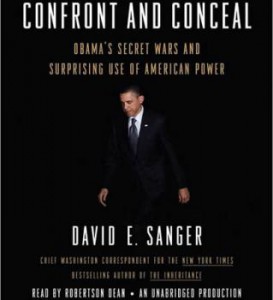By Paul T. O’Connor
CONFRONT AND CONCEAL: OBAMA’S SECRET WARS AND SURPRISING USE OF AMERICAN POWER. By David E. Sanger. Read by Robertson Dean. Random House Audio. 13 CDs, 15 hours. $50. Also available in hardback from Crown.
 Given the way President Barack Obama has used the American military, whether in the Afghanistan surge, the drones over Pakistan and Yemen or the flexing of American naval muscle near China, it’s hard to believe that only five years ago, Obama was the liberal, pacifist darling in the field of the Democratic presidential aspirants.
Given the way President Barack Obama has used the American military, whether in the Afghanistan surge, the drones over Pakistan and Yemen or the flexing of American naval muscle near China, it’s hard to believe that only five years ago, Obama was the liberal, pacifist darling in the field of the Democratic presidential aspirants.
Looks like the Left got surprised there, eh?
David Sanger, The New York Times chief Washington correspondent, has written a heavily detailed, fascinating and gripping survey of the first 3½ years of the Obama presidency. Relying on his own reporting over those years, the trove of information that flooded into public view through WikiLeaks and follow-up interviews with key foreign affairs leaders, Sanger moves through the major theaters where Obama is employing American power.
This is a story of successes, failures and, in some cases, a young president learning on the job. It is also the story of the evolution of the Obama Doctrine, that the United States cannot be the policeman of the world, that it has limited resources and must restrain itself, using its resources only where the U.S. has a profound national interest.
Novice President Obama thought that the U.S. could fix Afghanistan. Now seasoned President Obama is looking for an “Afghanistan good enough.” That is, we can’t fix it, make it a model democracy in an undemocratic part of the world, but we can be enough of a stabilizing force to keep the government from falling entirely into the hands of the Taliban and other radical forces of Islam.
Sanger’s book is full of foreign policy insights and, in Obama’s plans for American involvement in Afghanistan, comes the first. We will have U.S. forces there for the foreseeable future. But, Sanger reports, they will be there primarily to keep our eyes on Pakistan and to position a military force capable of seizing Pakistan’s nuclear arms – should that government fall into the hands of radical Islamists.
America’s relationship with Pakistan is tortured, to say the least, and Sanger spends a considerable portion of the book trying to explain the many tensions therein. Maybe the most enlightening is his accounting of the Pakistani complaint with the U.S., their side of the argument.
With Libya, the Obama Doctrine was on full display. The U.S. had no great strategic reason to intervene. European interests were much greater, so Obama told our allies he’d support them, but not take the lead. Of course, our ill-prepared allies soon ran out of ammunition and we had to jump back in, supplying the missiles and bombs that eventually led to the fall of the Qaddafi family’s regime. (But, at least we’ll get repaid for those bombs.)
It is the Iran chapters of this book that are most enlightening and frightening. With Israel being run by the seductively persuasive Benjamin Netanyahu, and Mitt Romney seeking Jewish votes by promising the prime minister anything he wants, the Iranian nuclear issue is truly scary. Obama has asserted any number of different tactics, from the well-publicized tightening of the economic screws to the introduction of cyber war to take down the Iranian nuclear effort.
(Sanger, in his reporting on the cyber war, raises some serious questions about Obama’s decision to open that can of worms – pun intended – and the consequences for American security in the future.)
The bottom line on Iran is that there is no good option. The hawks want to bomb, but if we bomb we might not get all of the facilities, we might not reach the most important nuclear infrastructure. And we might set off a much longer and complicated war than the hawks imagine. (See Iraq, 2003, for further elaboration.) Even if we wipe out the program, the Iranians will still possess the knowledge they’ve gained, and we’ll be right back where we are today in five years.
Robertson Dean, a Broadway actor, does a remarkable job of reading this book. He hits all of the inflection points, and his pronunciation of names and places is impressive.
As the time to vote approaches, this is an important and engaging book to read or hear. To those who do not study foreign affairs, it promises to be truly enlightening.
- Paul T. O’Connor, contributing editor, is a university lecturer who is available for freelance writing assignments. Contact him at ocolumn@gmail.com.